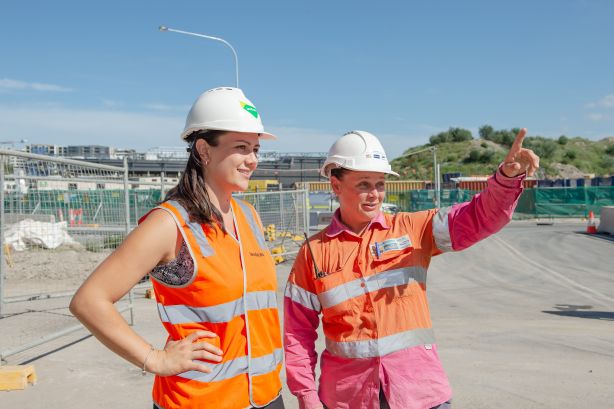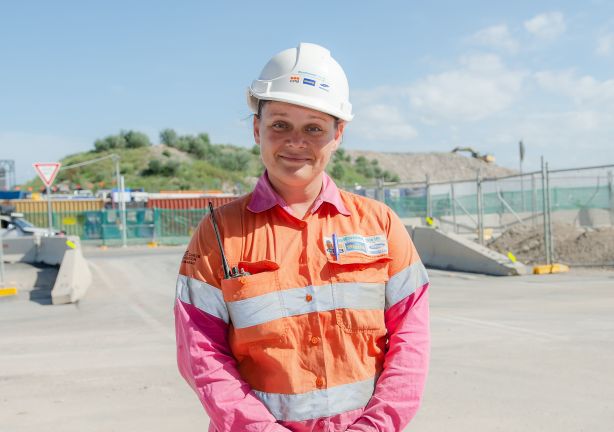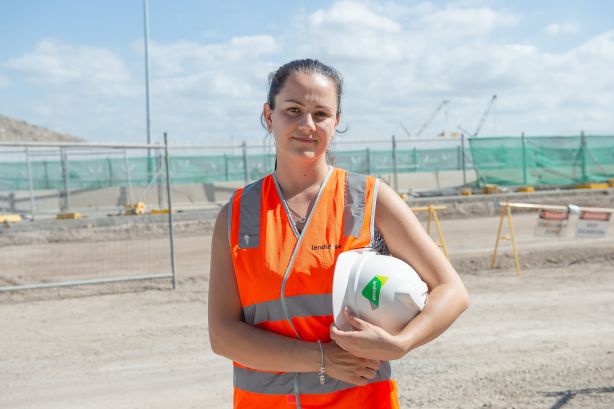Two young Indigenous women have become the latest graduates of an innovative scheme designed to prepare Aboriginal and Torres Strait Islander women for construction and engineering careers.
“I see a lot of opportunities ahead of me,” says 26-year-old Tarni Proberts-Roberts. “I definitely see this as a long-term career.”
Wiradjuri sisters Tara and Tarni Proberts-Roberts successfully completed training via the Aboriginal Employment Strategy programs to enable Indigenous women entry into construction careers.
Born and raised in Dubbo, and now living in Sydney, both women held full-time positions in the childcare industry for more than six years before joining the construction industry.
 Tarni and Tara Proberts-Roberts are recent graduates of the initiative. Photo: Andrew Rosenfeldt
Tarni and Tara Proberts-Roberts are recent graduates of the initiative. Photo: Andrew Rosenfeldt
Tarni joined iTradie after seeing her sister, Tara, pursue a career in civil construction after graduating from iCivil, another program offered by the Aboriginal Employment Strategy to encourage Indigenous women into construction and engineering careers.
“I chose to do the iTradie program as I felt like I was struggling to grow in my previous job in childcare,” says Tarni. “I wanted to challenge myself and learn new skills. After seeing how well my sister Tara was doing within her career in civil construction, it really motivated me to take a chance and start a new journey.”
The Australian National University report on Indigenous Australians in the labour market emphasises that poor quality and quantity of work is a major determinant in regards to health, ability to raise children in a safe and secure environment, financial independence and narrowing the gap (the official Closing The Gap goal is that 60 per cent of Aboriginal and Torres Strait Islander people aged 25 to 64 are employed by 2028).
Indigenous workers are a third more likely to be in construction than other industries, with a 5.1 per cent rise in Indigenous apprentices each year for the previous five years. Despite the construction industry being one of the highest industries employing Aboriginal and Torres Strait Islanders, only 10 per cent of those employed are women (according to the ABS).
 Tara Proberts-Roberts was national runner-up for trainee of the year. Photo: Andrew Rosenfeldt
Tara Proberts-Roberts was national runner-up for trainee of the year. Photo: Andrew Rosenfeldt
While many unfamiliar with the construction and engineering industry may imagine that all the jobs for skilled tradespeople involve boots and helmets, Tarni works as a procurement assistant spends most of her day at the computer organising the administrative logistics of major construction projects.
“As the construction industry is quite new to me, I like that my manager encourages me to learn new skills by introducing me to different areas whether that be gaining a new ongoing weekly task or simply getting exposure to different areas by assisting others within the office,” she says.
Her sister, Tara, graduated with a trainee of the year nomination in her region and state and was national runner-up for trainee of the year.
 ‘I see a lot of opportunities ahead of me,’ says Wiradjuri woman Tarni Proberts-Roberts. Photo: Andrew Rosenfeldt
‘I see a lot of opportunities ahead of me,’ says Wiradjuri woman Tarni Proberts-Roberts. Photo: Andrew Rosenfeldt
Tara was able to complete a certificate 3 in civil construction and is now a dogger (directing and advising crane operators) and labourer working on the new M5 in St Peters, Sydney.
“Being recognised as doing well in my career and studies helped cement the fact I’ve made a good choice in my career change,” says Tara.
Of the AES graduates, 75 have secured full-time careers in the construction industry, while the other 20 have secured casual employment on major projects sites around Sydney.
“I feel like times are changing and it’s becoming a women’s world. I am excited to see what is in store for the future of women in construction. I see how quickly and widely it’s spreading and I would love to see more women become involved,” says Tara.
“I advise my Aboriginal and Torres Strait Islander sisters to apply for a role in the civil construction industry as it’s a very rewarding career. To see a project from start through to finish is amazing. The amount of new skills and information you’ll receive is huge. This is not just for men any more.”








